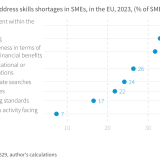
Employment and labour markets
Employment and labour markets is one of Eurofound's main operational activities for its 2025–2028 programming period. Building on the past 50 years of research, Eurofound continues to provide knowledge to identify structural changes in the labour market and to inform employment policies to improve the functioning and inclusiveness of a rapidly changing labour market.
Eurofound’s work is shaped by the opportunities and challenges arising from four mega-drivers: demographic change, climate change, technological change and re-globalisation. The research investigates labour market dynamics, company practices, restructuring and social partner involvement in addressing these changes to provide evidence to inform the understanding of the EU’s competitiveness and to reinforce socioeconomic resilience.
























